Why are history majors successful in legal careers?
Of the sixteen United States Supreme Court justices appointed in the past half century, five majored in history as undergraduates; of the current members, a plurality--four justices--were history majors. Similarly, though history majors make up only about 1.5 percent of the college-educated population of the United States, more than twenty percent of state supreme court members and roughly fourteen percent of all state supreme court chief justices hold bachelor’s degrees in history. History is one of the most common undergraduate majors for practicing lawyers in the United States today. Why?
“Law schools want applicants to have demonstrated that they are able to engage in skills required in the practice and study of law—to think critically, to read and comprehend large amounts of information, to conduct legal research, to communicate effectively orally and in writing, and to resolve complex legal problems using logical reasoning.”
—George E. Edwards, LL.M. Roadmap
“. . . historical thinking allows us to see the law as something other than static. By explaining continuity and change, the study of history helps ‘an advocate shift people away from seeing the law as it is’ to understand how it has been ‘constructed and applied.’”
—Adele Nye and Jennifer Clark, Teaching History for the Contemporary World
“Indeed, the past is itself authoritative to a certain degree in the legal system. Law is at its core based on resolving issues presented by past conduct. The practice of litigation is, to a great extent, an exercise in establishing a certain interpretation of past events. What actually happened? Who is at fault? The outcome of a case may hinge on which side does the best at convincing the court that its story about what happened—its version of historical truth—is the most accurate. Thus, in spite of the professional differences between law and history, it is the very thing that they have in common (at a certain level of abstraction) that makes history so powerful as a rhetorical and evidentiary device: the appeal to an authoritative explanation of the past.”
—Matthew J. Festa, “Applying a Usable Past: The Use of History in Law”
“When learning about the law, history is an important subject for students. It provides an understanding of social movements, economic realities, and political beliefs at the time a law was passed. This provides students with the context to understand why a particular law was enacted. Many of the laws from the past are still in effect today. For those that have changed, studying history allows a student to follow a law’s path over time. These factors affect how a lawyer interprets the law.”
—Kate Conley, Amy Coney Barrett: Supreme Court Justice
“When looking for evidence, a historian is like a detective, but when presenting evidence, a historian is like a litigation lawyer. Both derive arguments from evidence, describe what they think happened, and try to convince others to agree with them. Lawyers are historians who specialize in modern legal problems. Their archives consist of file folders at the police station. Common law precedent is their historiography. Black letter law—the foundational aspects of law generally free from disputes—is only part of the knowledge that lawyers can draw on. Historians, as well, are shaped by procedural process and by a common stock of ideas about how the world works. Law, like history, recognizes competing narratives, in which adversaries argue for the best interpretation.”
—Michael Douma, Creative Historical Thinking
“A nuanced, balanced presentation can still be persuasive, and is in fact probably more persuasive than a clear, one-sided view. As a historian, you cannot present half of a case, make an ambiguous charge, or claim that the problem is too complicated to be understood. You must state the defendant’s plea up front; that is, your thesis must appear in the first few pages. Do not wait until the end to present your position; do not wait till the end of the day to tell the jury that the defendant is not guilty.”
—Michael Douma, Creative Historical Thinking
“. . . our nation’s highest judicial officers have expressed their deep interest in history and the study of history. The uses of history have been a source of substantial discussion among judicial officers, including our most recent nominee to the United States Supreme Court [Chief Justice John Roberts]. Accuracy in assessing the historical standing and perspective of judicial officers thus has great instrumental value.”
—Michael S. Lewis, “Confronting a Monument: The Great Chief Justice in an Age of Historical Reckoning”
“The legal profession is undeniably fond of history. Lawyers, judges, and legal scholars love to cite historical evidence and to make historical arguments, for many reasons: it conveys a sense of authority and legitimacy; it grounds arguments in continuity with tradition and precedent; and, not least, because the law is in large part about the reconstruction of past events. Indeed, as Richard Posner has stated, ‘Law is the most historically oriented, or if you like the most backward-looking, the most 'past dependent,' of the professions.’”
—Matthew J. Festa, “Applying a Usable Past: The Use of History in Law”
“ . . . the fact is that from judges to law professors, from practicing attorneys to laypersons, and from all areas on the political and ideological spectra, many Americans do conceive of the law in historical terms. Because of this, the use of history in law will never go away. . . . . . . Historical evidence is so appealing to lawyers in part because it provides historical authority for legal interpretations. Daniel Farber has noted that ‘[t]he linkage between past and present is especially central in law.’ Common law adjudication is based upon stare decisis, meaning that the body of prior caselaw that developed over the course of time must be interpreted to apply to new controversies. Our substantive doctrines of property, tort, and contract have developed over centuries of tradition. In statutory construction, legislative history is often consulted to illuminate the intentions of the law’s drafters. And in American constitutional theory, the past is centrally important both to originalists and nonoriginalists alike.”
—Matthew J. Festa, “Applying a Usable Past: The Use of History in Law”
Notable people in legal careers who majored in history
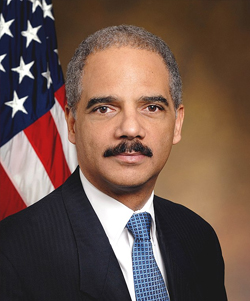
Eric Holder, U.S. Attorney General under Obama
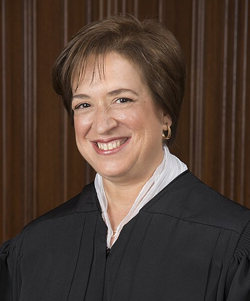
Elena Kagan, Associate Justice, Supreme Court of the United States
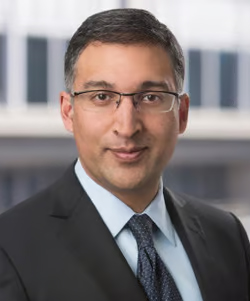
Neal Katyal, former Acting Solicitor General of the United States
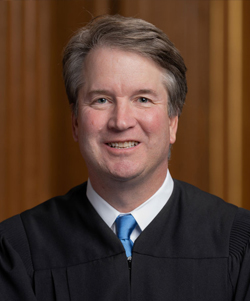
Brett Kavanagh, Associate Justice, Supreme Court of the United States
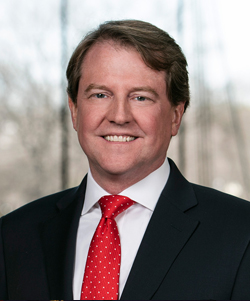
Don McGahn, former White House Counsel
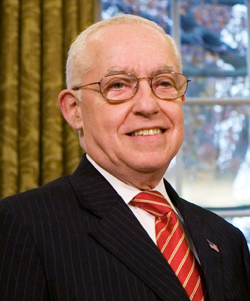
Michael Mukasey, former U.S. attorney general
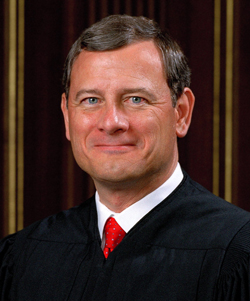
John Roberts, Chief Justice, Supreme Court of the United States
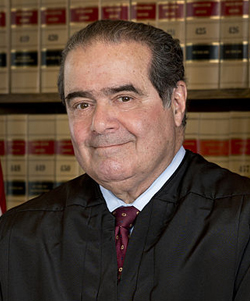
Antonin Scalia, former Associate Justice, Supreme Court of the United States
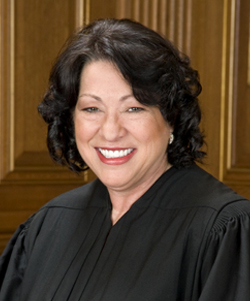
Sonia Sotomayor, Associate Justice, Supreme Court of the United States
Others
Roberta Achtenberg, former member, U.S. Commission on Civil Rights
Jonathan H. Adler, environmental law specialist
Gerry L. Alexander, former Chief Justice of the Supreme Court of Washington state
Vikram Amar, Dean of the University of Illinois College of Law
Tim Armstead, Chief Justice of the West Virginia Supreme Court
John Ashcroft, former U.S. Attorney General
Barry Axelrod, sports and entertainment lawyer
M.A. Aziz, former judge, Supreme Court of Bangladesh
C. Shannon Bacon, Chief Justice, Supreme Court of New Mexico
Michael R. Barrett, Senior Judge, Southern District of Ohio
Julie H. Becker, Associate Judge of the Superior Court of D.C.
Jimmy Blacklock, Associate Justice of the Texas Supreme Court
Rob Bonta, Attorney General of California
Charles Bright, Justice, Supreme Court of South Australia
Howard W. Brill, former Chief Justice of the Arkansas Supreme Court
Eric Brown, former Chief Justice, Ohio Supreme Court
Jose A. Cabranes, Senior Judge, U.S. Court of Appeals for the Second Circuit
Susan M. Carney, Associate Justice, Supreme Court of Alaska
Walter L. Carpeneti, former Chief Justice of the Alaska Supreme Court
Sue Bell Cobb, former Chief Justice of the Alabama Supreme Court, first woman in that role
Josiah D. Coleman, Justice, Mississippi Supreme Court
Sharon Johnson Coleman, US District Judge, Northern District of Illinois
Christian Compton, former Justice, Supreme Court of Virginia
Jonathan Cooper, human rights activist, editor of European Human Rights Law
Denise Cote, Senior District Judge, US District Court for SDNY
Archibald Cox, Watergate special prosecutor
David Crane, former Chief Prosecutor of the Special Court for Sierra Leone
Lloyd Cutler, White House Counsel for Presidents Carter and Clinton
Pat DeWine, Judge, Ohio Supreme Court
Bertis Downs IV, entertainment lawyer, R.E.M. manager
Eric Dreiband, former Assistant U.S. Attorney General for Civil Rights Division
Frank Drowota, former Chief Justice, Tennessee Supreme Court
David Drummond, Sr. VP of corporate development and chief legal officer, Alphabet
Catharine F. Easterly, Judge, District of Columbia Court of Appeals
Sam J. Ervin IV, former Judge, North Carolina Supreme Court
Terence Etherton, Chancellor of the UK High Court
Matthew J. Fader, Chief Justice, Supreme Court of Maryland
Lila Fenwick, first black woman to be graduated from Harvard Law School
Patrick F. Fischer, Justice, Ohio Supreme Court
Ian Stewart Forrester, former judge, General Court of the Court of Justice of the EU
Judith L. French, former Justice, Ohio Supreme Court
Eric J. Fygi, former Deputy General Counsel for U.S. Department of Energy
Paul Gallagher, former Attorney General of Ireland
George Gascon, former police officer, District Attorney of Los Angeles County
Gustavo Gelpí, Judge, United States Court of Appeals for the First Circuit
Caitlin Halligan, Solicitor General of the U.S. under Obama
Brad Handler, founder and chairman, Inspirato; first legal counsel for eBay
Dyson Heydon, member, High Court of Australia
Gregory J. Hobbs Jr., former Associate Justice, Colorado Supreme Court
Jefferson D. Hughes, Justice, Louisiana Supreme Court
Natalie Aleta Jackson, trial attorney in Trayvon Martin case
Theodore T. Jones, former Justice, New York Supreme Court
Khaled Kabub, first permanent Muslim member of the Supreme Court of Israel
Pamela S. Karlan, former Principal Deputy Asst. AG, Civil Rights Division, US DOJ
Josh Kaul, Attorney General of Wisconsin
Randall Kennedy, Harvard Law professor
Henry Kerner, Special Counsel of the United States
Raymond Kethledge, Judge, U.S. Court of Appeals for the Sixth Circuit
Hima Kohli, Judge, Supreme Court of India
Howard Krongard, former Inspector General of the U.S. Department of State
Bernice Lake, first Caribbean woman appointed Queen’s Counsel
Bill Lann Lee, Asst. U.S. Attorney General for Civil Rights Division under Clinton
Charles F. Lettow, Senior Judge, US Court of Federal Claims
Marla Luckert, Chief Justice of the Kansas Supreme Court
Neil MacBride, General Counsel, U.S. Department of the Treasury
Asif Ali Malik, Advocate of Supreme Court of Pakistan
Sigrid McCawley, attorney representing Epstein victims
Marc McGinnes, environmental lawyer, co-founder, Environmental Defense Center
John Mitnick, former General Counsel for U.S. Department of Homeland Security
William A. Moorman, Senior Judge of US Court of Appeals for Veterans Claims
Patrick Morrisey, Attorney General of West Virginia
Sheela Murthy, immigration lawyer
B.V. Nagarathna, judge, Supreme Court of India
Steven Naifeh, Pulitzer Prize winner biographer, founder of Best Lawyers
Frank Q. Nebeker, Senior Judge of the U.S. Court of Appeals for Veterans Claims
Ronald E. Nehring, former Justice, Utah Supreme Court
Maureen O’Connor, first female Chief Justice of the Supreme Court of Ohio
Maite Oronoz Rodriguez, Chief Justice, Supreme Court of Puerto Rico
Richard Painter, former White House Ethics Lawyer
Jonathan Papik, Associate Justice, Nebraska Supreme Court
Paul Pfeiffer, former Justice, Ohio Supreme Court
Patrick F. Philbin, Deputy Counsel to the President under Trump
Peter J. Phipps, judge, US Court of Appeals for the Third Circuit
Susan Westerberg Prager, former Dean and President Southwestern Law School
Erin Lynch Prata, Associate Justice, Rhode Island Supreme Court
Gerald A. Reynolds, former Chair, U.S. Commission on Civil Rights
R. William Riggs, former Justice, Oregon Supreme Court
Mimi Rocah, District Attorney for Westchester County, NY, legal commentator
Anabelle Rodriguez, former Associate Justice, Supreme Court of Puerto Rico
Loretta Rush, Chief Justice, Supreme Court of Indiana
Jon Sands, public defender and Co-Chair, Federal Defender Legislative Committee
Gerald F. Schroeder, former Chief Justice of Idaho
Richard Seeborg, Chief US District Judge, Northern District of California
Meir Shamgar, Chief Justice of the Israeli Supreme Court
Walter Shaub, former Director of the U.S. Office of Government Ethics
Leigha Simonton, U.S. Attorney for the Northern District of Texas
Leonard P. Stark, Judge, US Court of Appeals for the Federal Circuit
Kenneth Starr, former special counsel, law school dean
Josh Stein, Attorney General of North Carolina
Karen Steyn, UK High Court judge
Leonard Strickman, founding Dean of the Florida International University College of Law
Scott W. Stucky, Senior Judge, U.S. Court of Appeals for the Armed Forces
Jeffrey Sutton, Chief Judge, U.S. Court of Appeals for the Sixth Circuit
Margaret M. Sweeney, Senior Judge, U.S. Court of Federal Claims
Mauricio J. Tamargo, 14th Chair of the Foreign Claims Settlement Commission
G. Flint Taylor, human rights attorney
Mary Jane Theis, Chief Justice, Supreme Court of Illinois
Jeffrey Toobin, CNN legal journalist
Gary Traynor, Justice, Delaware Supreme Court
William Treanor, Dean of the Georgetown University Law Center
David Uhlmann, Assistant Administrator, EPA Office of Enforcement and Compliance
Laurence B. VanMeter, Chief Justice, Kentucky Supreme Court
Julie J. Vargas, Justice, New Mexico Supreme Court
Donald B. Verrilli, Jr., former Solicitor General of the United States
Yevgeny Vindman, deputy legal advisor, NSC
John Warner, former Associate Justice, Montana Supreme Court
Thomas D. Waterman, justice, Iowa Supreme Court
Joseph M. Watt, former Chief Justice of Oklahoma
Michael C. Wholley, former General Counsel for NASA
Beth Ann Williams, member, Privacy and Civil Liberties Oversight Board
Helen Winkelmann, Chief Justice of New Zealand
Victor J. Wolski, Senior Judge, U.S. Court of Federal Claims
Evan Young, Associate Justice, Supreme Court of Texas
Efraim Zuroff, Nazi hunter, Director of the Simon Wiesenthal Center
